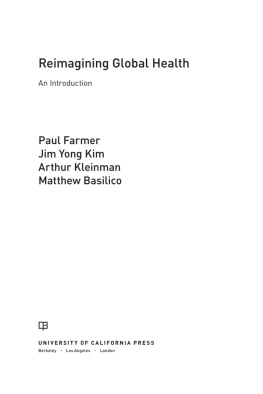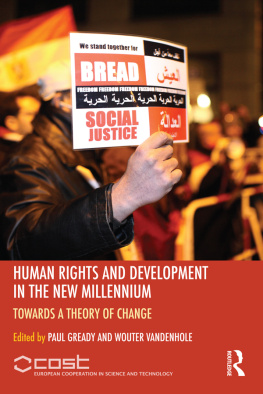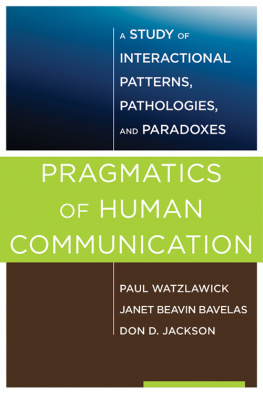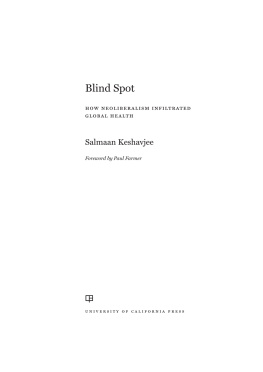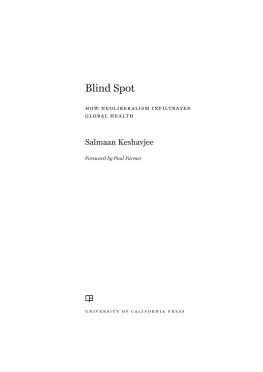Paul Farmer - Pathologies of Power: Health, Human Rights, and the New War on the Poor
Here you can read online Paul Farmer - Pathologies of Power: Health, Human Rights, and the New War on the Poor full text of the book (entire story) in english for free. Download pdf and epub, get meaning, cover and reviews about this ebook. year: 2009, genre: Politics. Description of the work, (preface) as well as reviews are available. Best literature library LitArk.com created for fans of good reading and offers a wide selection of genres:
Romance novel
Science fiction
Adventure
Detective
Science
History
Home and family
Prose
Art
Politics
Computer
Non-fiction
Religion
Business
Children
Humor
Choose a favorite category and find really read worthwhile books. Enjoy immersion in the world of imagination, feel the emotions of the characters or learn something new for yourself, make an fascinating discovery.
- Book:Pathologies of Power: Health, Human Rights, and the New War on the Poor
- Author:
- Genre:
- Year:2009
- Rating:5 / 5
- Favourites:Add to favourites
- Your mark:
- 100
- 1
- 2
- 3
- 4
- 5
Pathologies of Power: Health, Human Rights, and the New War on the Poor: summary, description and annotation
We offer to read an annotation, description, summary or preface (depends on what the author of the book "Pathologies of Power: Health, Human Rights, and the New War on the Poor" wrote himself). If you haven't found the necessary information about the book — write in the comments, we will try to find it.
Pathologies of Power: Health, Human Rights, and the New War on the Poor — read online for free the complete book (whole text) full work
Below is the text of the book, divided by pages. System saving the place of the last page read, allows you to conveniently read the book "Pathologies of Power: Health, Human Rights, and the New War on the Poor" online for free, without having to search again every time where you left off. Put a bookmark, and you can go to the page where you finished reading at any time.
Font size:
Interval:
Bookmark:
"In his compelling book, Farmer captures the central dilemma of our times-the increasing disparities of health and well-being within and among societies. While all member countries of the United Nations denounce the gross violations of human rights perpetrated by those who torture, murder, or imprison without due process, the insidious violations of human rights due to structural violence involving the denial of economic opportunity, decent housing, or access to health care and education are commonly ignored. Pathologies of Power makes a powerful case that our very humanity is threatened by our collective failure to end these abuses."
ROBERT S. LAWRENCE, President of Physicians for Human Rights and Professor of Preventive Medicine, Johns Hopkins University
"Pathologies of Power is a passionate critique of conventional biomedical ethics by one of the world's leading physician-anthropologists and public intellectuals. Farmer's on-the-ground analysis of the relentless march of the AIDS epidemic and multidrug-resistant tuberculosis among the imprisoned and the sickpoor of the world illuminates the pathologies of a world economy that has lost its soul."
NANCY SCHEPER-HUGHES, author of Death without Weeping: The Violence of Everyday Life in Brazil
"Wedding medicine and anthropology, painstaking clinical and field observation with rigorous conceptual elaboration, Farmer gives us that most rare of books: one that opens both our minds and hearts. Pathologies of Power uses the prism of public health to illuminate the structural forces that decide the `right to survive' on the global stage. From Haiti to Russia to the United States, Farmer reveals the drama of the social production of mass sickness, suffering, and death without dramatizing, and then grapples with the tough moral issues without moralizing. He shows how market rule results in vertiginous violations of basic social and economic rights that in turn translate into escalating pathologies that ravage the poor. This book stands as a model of engaged scholarship and an urgent call for social scientists to forsake their cushy disregard for human rights at home and abroad."
LOIC WACOUANT, author of Prisons of Poverty
CALIFORNIA SERIES IN PUBLIC ANTHROPOLOGY
The California Series in Public Anthropology emphasizes the anthropologist's role as an engaged intellectual. It continues anthropology's commitment to being an ethnographic witness, to describing, in human terms, how life is lived beyond the borders of many readers' experiences. But it also adds a commitment, through ethnography, to reframing the terms of public debate-transforming received, accepted understandings of social issues with new insights, new framings.
SERIES EDITOR: Robert Borofsky (Hawaii Pacific)
CONTRIBUTING EDITORS: Nancy Scheper-Hughes (UC Berkeley), Philippe Bourgois (UC San Francisco), and Arturo Escobar (University of North Carolina)
UNIVERSITY OF CALIFORNIA PRESS EDITOR: Naomi Schneider
i. Twice Dead: Organ Transplants and the Reinvention of Death, by Margaret Lock
z. Birthing the Nation: Strategies of Palestinian Women in Israel, by Rhoda Ann Kanaaneh; with a Foreword by Hannan Ashrawi
3. Annihilating Difference: The Anthropology of Genocide, edited by Alexander Laban Hinton, with a Foreword by Kenneth Roth
4. Pathologies of Power: Health, Human Rights, and the New War on the Poor, by Paul Farmer; with a Foreword by Amartya Sen
PAUL FARMER
WITH A FOREWORD BY AMARTYA SEN
Our system is one of detachment: to keep silenced people from asking questions, to keep the judged from judging, to keep solitary people from joining together, and the soul from putting together its pieces.
Eduardo Galeano, "Divorces"
Sometimes the lack of substantive freedoms relates directly to economic poverty, which robs people of the freedom to satisfy hunger, or to achieve sufficient nutrition, or to obtain remedies for treatable illnesses, or the opportunity to be adequately clothed or sheltered, or to enjoy clean water or sanitary facilities.
In other cases, the unfreedom links closely to the lack of public facilities and social care, such as the absence of epidemiological programs, or of organized arrangements for health care or educational facilities, or of effective institutions for the maintenance of local peace and order.
In still other cases, the violation of freedom results directly from a denial of political and civil liberties by authoritarian regimes and from imposed restrictions on the freedom to participate in the social, political and economic life of the community.
Amartya Sen, Development as Freedom
Rats and roaches live by competition under the law of supply and demand; it is the privilege of human beings to live under the laws of justice and mercy.
Wendell Berry
"Every man who lives is born to die," wrote John Dryden, some three hundred years ago. That recognition is tragic enough, but the reality is sadder still. We try to pack in a few worthwhile things between birth and death, and quite often succeed. It is, however, hard to achieve anything significant if, as in sub-Saharan Africa, the median age at death is less than five years.' That, I should explain, was the number in Africa in the early 199os, before the AIDS epidemic hit hard, making the chances worse and worse. It is difficult to get reliable statistics, but the evidence is that the odds are continuing to fall from the already dismal numbers. Having made it beyond those early years, it may be difficult for us to imagine how restricted a life so many of our fellow human beings lead, what little living they manage to do. There is, of course, the wonder of birth (impossible to recollect), some mother's milk (sometimes not), the affection of relatives (often thoroughly disrupted), perhaps some schooling (mostly not), a bit of play (amid pestilence and panic), and then things end (with or without a rumble). The world goes on as if nothing much has happened.
The situation does, of course, vary from region to region, and from one group to another. But unnecessary suffering, debilitation, and death from preventable or controllable illness characterize every country and every society, to varying extents. As we would expect, the poor countries in Africa or Asia or Latin America provide crudely obvious illustrations of severe deprivation, but the phenomenon is present even in the richest countries. Indeed, the deprived groups in the "First World" live, in many ways, in the "Third." For example, African Americans in some of the most prosperous U.S. cities (such as New York, Washington, or San Francisco) have a lower life expectancy at birth than do most people in immensely poorer China or even India. Indeed, location alone may not enhance one's overall longevity.
EXPLANATION AND REMEDY
How can we come to terms with the extensive presence of such adversity-the most basic privation from which human beings can suffer? Do we see it simply as a human predicament-an inescapable result of the frailty of our existence? That would be correct had these sufferings been really inescapable, but they are far from that. Preventable diseases can indeed be prevented, curable ailments can certainly be cured, and controllable maladies call out for control. Rather than lamenting the adversity of nature, we have to look for a better comprehension of the social causes of horror and also of our tolerance of societal abominations. However, despite many illuminating studies of particular aspects of these general problems, investigators tend to shy away from posing the questions in their full generality. To confront the big picture seems like an overpowering challenge.
Paul Farmer, however, is not easily overpowered. He is a great doctor with massive experience of working against the hardest of diseases in the most adverse of circumstances, and, at the same time, he is a proficient and insightful anthropologist with far-reaching discernment and understanding. Farmer's knowledge of maladies such as AIDS and drug-resistant tuberculosis, which he fights on behalf of his indigent patients, is hard to match. This he combines with his remarkable expertise on culture and society, acquired not just by learning from a distance but also from actually living and working in different parts of the deprived world. In addition, Paul Farmer is a public health interventionist with a dogged determination to work toward changing iniquitous institutions and mismatched arrangements. As the co-director of Harvard's Program in Infectious Disease and Social Change (working with Dr. Jim Yong Kim, another remarkable public health expert), Farmer has led several major initiatives in changing the direction of health care and intervention (for example, in tackling drug-resistant TB).
Font size:
Interval:
Bookmark:
Similar books «Pathologies of Power: Health, Human Rights, and the New War on the Poor»
Look at similar books to Pathologies of Power: Health, Human Rights, and the New War on the Poor. We have selected literature similar in name and meaning in the hope of providing readers with more options to find new, interesting, not yet read works.
Discussion, reviews of the book Pathologies of Power: Health, Human Rights, and the New War on the Poor and just readers' own opinions. Leave your comments, write what you think about the work, its meaning or the main characters. Specify what exactly you liked and what you didn't like, and why you think so.


